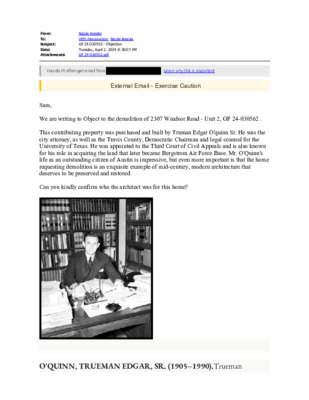15.c - 2307 Windsor Rd #2 - public comment — original pdf
Backup

From: To: Subject: Date: Attachments: Nicole Kessler HPD Preservation; Nicole Kessler GF 24-030562 - Objection Tuesday, April 2, 2024 8:38:07 PM GF 24-030562.pdf You don't often get email from . Learn why this is important External Email - Exercise Caution Sam, We are writing to Object to the demolition of 2307 Windsor Road - Unit 2, GF 24-030562 . This contributing property was purchased and built by Truman Edgar O'quinn Sr. He was the city attorney, as well as the Travis County, Democratic Chairman and legal counsel for the University of Texas. He was appointed to the Third Court of Civil Appeals and is also known for his role in acquiring the land that later became Bergstrom Air Force Base. Mr. O'Quinn's life as an outstanding citizen of Austin is impressive, but even more important is that the home requesting demolition is an exquisite example of mid-century, modern architecture that deserves to be preserved and restored. Can you kindly confirm who the architect was for this home? O'QUINN, TRUEMAN EDGAR, SR. (1905–1990).Trueman O'Quinn, attorney, judge, and historian, was born in Leesville, Louisiana, on May 7, 1905, to Dallas Patrick and Florence Isabelle (O'Connor) O'Quinn. He was one of three children. In 1917 the family left Vernon Parish and moved to East Texas. As a child, O'Quinn was active in Boy Scouts and eventually became an Eagle Scout. He graduated from Beaumont High School in 1922 and enrolled at the University of Texas that same year. O'Quinn supported himself through college by teaching fencing and writing syndicated news stories. He also served as editor of the Daily Texan, 1927–1928. After completing his bachelor's degree, O'Quinn studied law and passed the bar in 1932. He remained in Austin, where he opened a private practice. O'Quinn's interest in law led him to politics. He was elected to the Forty- Second Texas Legislature and served the 1931–1932 term as a representative for Jefferson County. In 1936, O'Quinn was appointed assistant city attorney of Austin, and by 1939 was city attorney. With the exception of the years he served during World War II, he held the position until 1950. During the war, O'Quinn served in various capacities. He was a lt. colonel in the 101st Airborne Division and fought in four major battles. As Staff Judge Advocate, he supervised court-martial trials in Normandy after the Allied invasion. He also served with the army of occupation in Germany and supervised the out-processing of German prisoners in Austria. O'Quinn stepped down as city attorney in 1950 and returned to private practice for another twenty-six years. O'Quinn also served as Travis County Democratic Chairman for fourteen years and legal counsel for the University of Texas for two years. In 1967 Governor John Connally appointed him to the Third Court of Civil Appeals to serve the unexpired term of Judge Phillips. Justice O'Quinn remained on the court for thirteen years before his retirement in 1980. He is remembered for his work on health care regulations, the acquisition of land that later became Bergstrom Air Force Base, and the expansion of Austin's park system. Aside from legal affairs, O'Quinn was also active in civic life. He was a historian of American short story writer, William Sydney Porter, better known as O. Henry. For almost half a century he gathered first editions, photos, manuscripts, and other memorabilia. He donated the staggering collection to The O. Henry Resources at the Austin History Center in 1982, a contribution without parallel. Throughout his adult life, O'Quinn wrote articles and delivered speeches on the subject of O. Henry. In 1986 he co-authored Time to Write: How William Sidney Porter Became O. Henry with Dr. Jenny Lind Porter. O'Quinn's interests also included studying local history. His essay entitled "Colloquialisms along the Sabine" was included in J. Frank Dobie's 1937 publication Straight Texas, a collection of articles dealing with Texas history and folklore. O'Quinn held memberships in numerous professional and civic organizations including the American Bar Association, Sigma Delta Chi, American Legion, Heritage Society, Reserve Officers Association, O.Henry Advisory Board, and Philosophical Society of Texas. O'Quinn married Hazel Allene Hedick on November 26, 1929. Together they had two sons, Kerry Hedick and Trueman, Jr. On January 4, 1990, Trueman O'Quinn died in Austin of heart failure following open heart surgery. He is buried at the Texas State Cemetery in Austin. Thank you for your time and consideration. Nicole and William Kessler CAUTION: This is an EXTERNAL email. Please use caution when clicking links or opening attachments. If you believe this to be a malicious or phishing email, please report it using the "Report Message" button in Outlook or forward to cybersecurity@austintexas.gov.